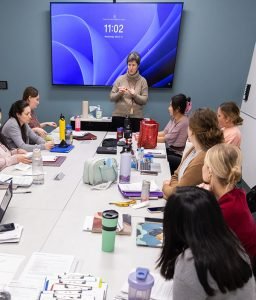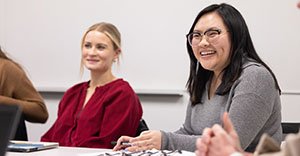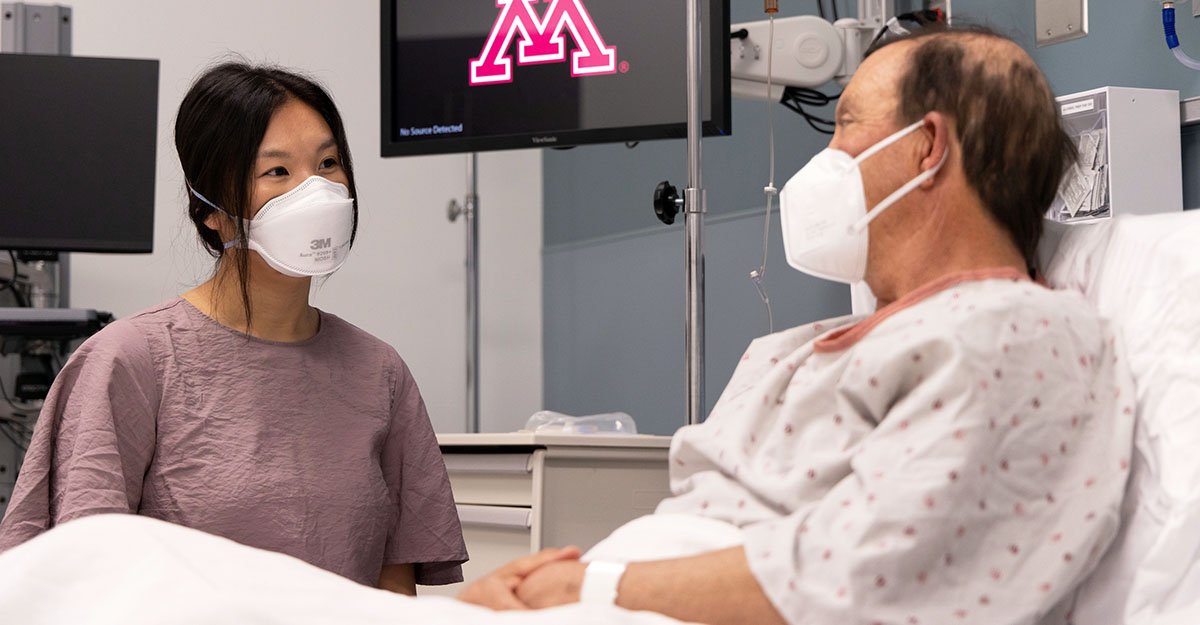The patient lies back in the hospital bed, weak with malnutrition. She is suffering from severe Chrohn’s disease. A dietitian enters the room, engaging with the patient to better understand her symptoms, and recommends a plan to gain back strength through appropriate nutrition. Behind a one-way mirror, the entire conversation is being recorded, which both people in the room know. The room is not in a hospital, but part of the University’s Clinical Simulation Lab where trained actors help to create a real-world practice experience for students in the University of Minnesota School of Public Health (SPH) Public Health Nutrition MPH coordinated program. The simulated experience is meant to feel real, but unlike with an actual patient, mistakes are encouraged.
“The simulated clinical experience is a huge opportunity to learn and make mistakes,” says Amy Pleimling, director of the Coordinated Program in Dietetics and Public Health Nutrition. “This is low stakes. Students are coached to be open to feedback and use the experience as a learning opportunity.”
Comprehensive, Rigorous, Supportive
The clinical practice counts as part of the 1,000-hour accreditation process that students in the program fulfill in order to earn their MPH and simultaneously become registered dietitians. It is a rigorous, two-year program with a small cohort of students from a wide range of backgrounds, which is a big factor in what attracts students to the program.

“I came to the program partially because of the diverse groups in each cohort, and the ability to learn from people with different educational backgrounds,” said MPH student Melanie Maldonado. “Learning from your peers really enriches the experience.”
The other reason Maldonado was drawn to the program was the diverse clinical rotations. The public health nutrition students in the coordinated program spend time in a school district, advising their food services, along with a community-based organization, offering food assistance and nutrition for those in need. They also rotate through a long-term care organization, the Special Supplemental Nutrition Program for Women, Infants, and Children (WIC), and cap off the two-year applied experience with a clinical rotation in the final summer of the program.
Experiential Learning
The simulations are in place to support students during their clinical rotation, and beyond. “It feels real; it looks real. It’s just us in the room with the patient, so it’s a good experience before actually being alone with a patient,” says Maldonado.
The students have four experiences in the simulation room during their program, two in the first year, and two in the second year. In the first year, the cases are easier and the simulation takes place in an outpatient setting. In the second year, students deal with more complicated cases in the simulated hospital room.
In both instances, students pair with a member of their cohort so they have the opportunity to engage as the clinician and as an observer. The simulation is recorded and the preceptor watches the videos and gives feedback to the student as they review the session. The entire process provides a 360-degree view of interacting with a patient as a dietitian.

MPH student Abby Rose admits that watching the video back is a little “cringey.” But, she adds that, “It’s a good teaching tool, and also a confidence booster when you see yourself doing something good.”
Each year, Pleimling reviews the cases to ensure they are relevant and as real-feeling as possible. She is also working on including more inclusive language to provide students with an understanding of how to develop culturally sensitive engagements with patients.
“It is so beneficial to have this hands-on, safe, positive learning environment,” says MPH student Mai Thao.” My preceptor gave me supportive feedback and I improved my skills, so I was better the second time around.”
With applied experience working with patients, coupled with actionable feedback, students can step into their clinical rotation with confidence in their abilities as a healthcare worker. “I still remember things from my simulation last year,” says Thao. “Applied experience sticks with you.”

